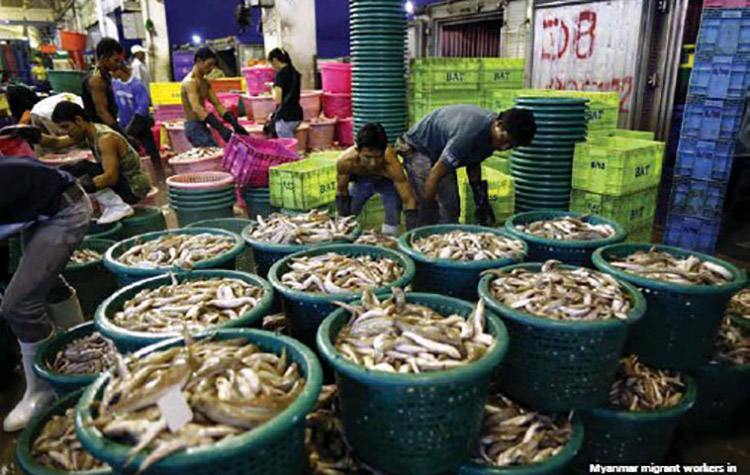(Bangkok, May 31, 2017)— We, the undersigned civil society organizations, urge Thai authorities and business enterprises in the country to uphold the United Nations Guiding Principles on Business and Human Rights.
Today, government agencies, representatives of the National Human Rights Commission of Thailand, business entities, and representatives from the U.N. Development Program participated in a seminar to discuss implementing and promoting the Guiding Principles in Thailand. The participants jointly agreed to raise better awareness and understanding of the public and private sectors’ roles under the framework of the Guiding Principles.
The Guiding Principles—adopted by the U.N. Human Rights Council in 2011—are 31 foundational and operational principles clarifying the duties and responsibilities of states and enterprises to respect and protect human rights and remedy human rights violations and abuses in the context of business activities.
We commend the efforts of the Thai government and business enterprises in Thailand to promote knowledge and understanding of the Guiding Principles. However, we remain concerned about continued abuses allegedly committed by business enterprises and government investment projects with impunity in Thailand.
Human rights defenders continue to be subjected to unchecked reprisals for engaging in legitimate activities to address alleged abuses by business enterprises and state actors. Human rights defenders involved in business and human rights issues have faced attacks, threats, and incidents of harassment, often without adequate protection from Thai authorities. Business enterprises and Thai authorities have brought trumped-up legal proceedings against human rights defenders who are critical of business operations. Thai authorities and business enterprises have used the Thai penal code criminalizing defamation, the Computer-related Crime Act criminalizing aspects of free speech, the Public Assembly Act restricting gatherings, and the broad powers of National Council for Peace and Order (NCPO) Orders to target human rights defenders. These laws and the stiff penalties they impose are inconsistent with international human rights standards.
Moreover, business activities with potentially adverse environmental and human rights impacts often proceed without meaningful consultation or the inclusion of affected communities in decision-making processes. There is also a general lack of transparency in the governance of and investment in business enterprises in Thailand.
Among other obligations, the Guiding Principles provide that states should “protect against human rights abuse within their territory and/or jurisdiction by third parties, including business enterprises,” ensure “the legitimate and peaceful activities of human rights defenders are not obstructed,” and ensure that business enterprises engage in “meaningful consultation with potentially affected groups and other relevant stakeholders, as appropriate to the size of the business enterprise and the nature and context of the operation.”
In line with the Guiding Principles, we call on Thai authorities and business enterprises to:
- Guarantee meaningful consultation with potentially affected communities in order to gauge environmental, human rights and public health risks with regard to government and business activities or as a result of the government’s business relationships.
- Protect the legitimate activities of human rights defenders. In particular, Thailand and its business enterprises should prevent unwarranted legal proceedings against human rights defenders working to promote and protect human rights in the context of business operations.
- Decriminalize all defamation-related offenses and amend domestic laws including the Thailand Penal Code, the Computer-related Crime Act, the Public Assembly Act, and certain NCPO Orders to make them compliant with international standards.
- Ensure effective access to remedies for adverse environmental, health, and other impacts of business activities as well as human rights violations and abuses. In particular, Thai authorities should ensure affected communities have access to Ministry of Justice mechanisms such as the Justice Fund and benefits provided by the Witness Protection Act that assist in facilitating legal representation and formal protection from potential reprisals.
- Prevent reprisals, including attacks, threats, and harassment, against human rights defenders. Thailand should also conduct impartial and independent investigations into reported human rights violations and abuses against human rights defenders committed in the context of business operations with a view to holding perpetrators accountable and ensuring effective remedies for victims.
- Promptly accept requests from the U.N. Special Rapporteur on the Situation of Human Rights Defenders and the U.N. Working Group on the Issue of Human Rights and Transnational Corporations and Other Business Enterprises to conduct official visits to Thailand and fully cooperate with such mechanisms.
Signatories:
Amnesty International Thailand
Asia Forum for Human Rights and Development (FORUM-ASIA)
Asian Institute for Human Rights
Community Resource Centre Foundation (CRC)
Cross Cultural Foundation (CrCF)
Duai Jai Group
ENLAWTHAI Foundation (EnLaw)
Ecological Alert and Recovery – Thailand (EARTH)
Fortify Rights
Human Rights Lawyers Association (HRLA)
Human Rights and Development Foundation (HRDF)
Karen Network for Culture and Environment
Khon Rak Ban Kerd Group (KRBKG)
Migrant Worker Rights Network (MWRN)
Migrant Working Group (MWG)
Protection International
Southern Peasants Federation of Thailand (SPFT)
Togetherness for Equality and Action (TEA)
Union for Civil Liberty (UCL)
Young Leadership for Social Change Program
For a PDF version of this statement, please click here. For a Thai version of this statement, please click here.




